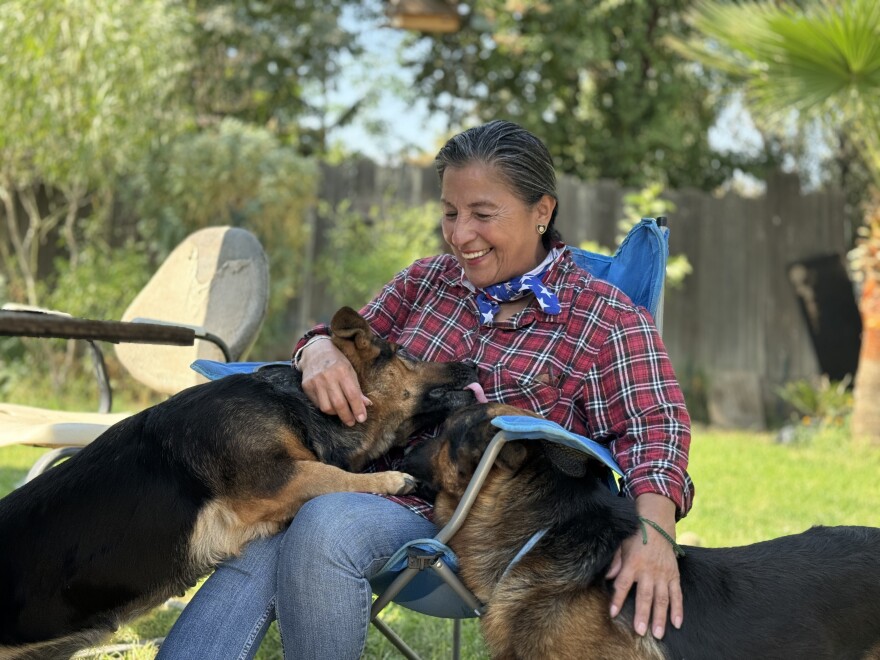CALWA, Calif. — Ever since Lourdes Cardenas migrated to the U.S. in 2003 from the Mexican state of Sinaloa, she’s worked in the fields picking fruits and vegetables. Most recently, she’s been harvesting tomatoes – and she loves it.
“The open air makes it feel like I’m back in Mexico,” Cardenas said in Spanish. “I feel free working in the fields, like the birds and the eagles.”
Cardenas lives in the unincorporated community of Calwa in south Fresno. While sitting in a lawn chair in her yard, with a pair of Dobermann-weenie puppies vying for her affection, Cardenas said she’s starting to feel uneasy about the election coming up on Tuesday.
That’s because Cardenas is undocumented, and former President Donald Trump has promised that, if he’s reelected, he would deport millions of immigrants like her who are in the country illegally.
As the election inches closer, she says she’s been having more sleepless nights and her blood pressure has been rising.

“This year feels like a repeat of 2016,” Cardenas said. “During that time, me and my companions were living in fear, getting sick, and hopeless. That can’t happen again. [The election] brings up a lot of negative emotions for farmworkers.”
Cardenas is among thousands of undocumented immigrants in the Central Valley. Like her, many said they came to the U.S. for a better life, facing economic hardships back at home.
Also like Cardenas, many of these immigrants work in the state’s largest industries, and experts warn the effects of mass deportations could be drastic – not just on the workers themselves, but on the economy as well.
Mass deportations: a ‘scary proposition’ for employers
At a recent rally in New York City – the same one where a comedian infamously made derogatory statements about Puerto Rico – Trump spoke of his plans in front of a crowd of thousands.
“On day one I will launch the largest deportation program in American history,” Trump said. “I will rescue every city and town that has been invaded and conquered. And we will put these vicious and bloodthirsty criminals in jail.”
Numerous data sets, including a recent one from the National Institute of Justice, show that undocumented immigrants commit violent crimes at a far lower rate than U.S. citizens.
Mass deportations would also prove to be challenging – and costly. An estimated 11 million people in the country are undocumented. Close to two million of those live in California.

Undocumented workers make up nearly half of the state’s agricultural workforce, according to the Department of Labor. These workers also dominate industries like manufacturing and construction.
Indeed, farm leaders from across the country say the effects from a mass deportation could be dire.
“It's a scary proposition for folks in a lot of industries,” said Daniel Hartwig, president of the California Fresh Fruit Association. “We can't replace 50% of the workforce overnight. That just doesn't work.”
Hartwig says replacing these workers and attracting new ones could be difficult – particularly because of the grueling physical labor.
“Those crops have certain windows that they need to get harvested in,” Hartwig said. ‘If you can't find people to do that, it's a huge problem. You're going to have fruit rotting on trees, grapes rotting in the vines.”
Pete Wiersma, the president of the Idaho Dairymen’s Association, recently told the New York Times that dairy production could plummet due to the policy.
”I don’t think there would be milk,” Wiersma told the Times. “I just don’t think we could get it done.
And while budding technology to automate farm labor can potentially help in the long-term, Hartwig says the best path forward now is to “take care of the folks that are here and that have been working in agriculture…make sure [they] have a path to citizenship.”
Beyond agriculture, leaders in other industries are concerned about the prospect of mass deportations. The National Association of Home Builders told NBC it considers foreign-born workers, regardless of legal status, “a vital and flexible source of labor” and that their loss would be “detrimental to the construction industry and our labor supply and exacerbate our housing affordability problems.”
Deportation ripple effects
Researchers nationwide predict deportations could lead to a widespread economic downturn.
According to a 2016 report by the Center for American Progress, deporting 7 million workers would “reduce national employment by an amount similar to that experienced during the Great Recession.”
In the Central Valley, Ed Flores from UC Merced’s Community and Labor Center says negative effects would start with local small businesses and ripple nationwide.
“Deportations are going to be destructive for everyone,” Flores said. “I don't believe anybody wins.”
Flores also warned: these employees can be especially vulnerable to intimidation and violence due to less access to basic rights.
“We're most concerned with those workers that are furthest on the margins of industries like agriculture or domestic work that don't have any modern day worker protections,” Flores said.
Beyond critical industries, Flores said the community could suffer major losses, with mixed-status families potentially being separated due to the policy.
Recent bills in the state legislature would have offered stronger safety nets for the undocumented population by extending unemployment benefits and providing easier pathways to file for workers compensation – but were vetoed by Governor Gavin Newsom.
Flores hopes that more legislation comes around to boost protections.

And workers, like Cardenas, are waiting for reform. Cardenas said she’s hopeful – despite hearing the former president talk about deporting her.
“We work in the fields to provide for our families. It’s honest, brave work,” she said. “It doesn’t matter what they say about us farmworkers, because we’re not hurting anyone. On the contrary, we’re feeding this country.”



